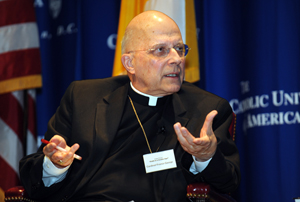
WASHINGTON (CNS) — A major research project studying faith in a secular age was launched at The Catholic University of America Nov. 19 with a forum featuring Templeton Prize winner Charles Taylor and Chicago Cardinal Francis E. George discussing the challenges posed by the topic.
Cardinal George, president of the U.S. Conference of Catholic Bishops, also holds a doctorate in philosophy and has taught the subject at the Oblate Seminary in Pass Christian, Miss., and at various universities.
Taylor, a Canadian Catholic philosopher whose most recent book is titled “A Secular Age,” was the recipient in 2007 of the Templeton Prize for exceptional contribution to life’s spiritual dimension. In 2008 he received the Kyoto Prize for arts and philosophy, often called the Japanese Nobel Prize.
In introducing the program, Oblate Father George F. McLean, president of the Council for Research in Values and Philosophy and director of Catholic University’s Center for the Study of Culture and Values, said there’s international and interfaith scholarly interest in the 15-month research project on the meaning of faith and the challenges and opportunities of evolving human awareness.
He said he had heard from a Baptist seminary, the oldest Muslim university in the world and one of the leading secular universities in Europe, all interested in following the study.
In his remarks, Taylor said contemporary secular society creates faith challenges unlike those of past generations. He traced a timeline beginning before the 17th century, with the context in which people understood mankind’s place in the cosmos.
The world was widely accepted to have been “designed by God,” and it was seen as full of signs pointing to a divine creator, he said. The secular world was “shot through” with evidence of signs of a creator beyond it.
As scientific inquiry developed and information accumulated it sometimes poked holes in what people previously believed to be evidence of God’s hand in the universe, Taylor explained.
An important shift occurred in the 17th century with the notion that the universe was ordered by human-caused events, or “a vast, impersonal, imminent world,” as opposed to one where God ordained every action.
“We can still connect with God … he’s made this magnificent design of the universe where everything fits together,” Taylor said. “He’s made this set of rules for human society … a very powerful notion of design.”
Then, with the rise in popularity of Darwinism in the 19th century, disagreement arose with the notion of a God-designed universe. Science and philosophy offered both factors “that make faith easy or obvious” and those that make it difficult, Taylor said.
Today, Taylor sees a society where people fall into categories of “seekers” or “dwellers.”
Seekers he defines as those who don’t want to be told by others what to believe. In a religious context, this may mean that they’re people who are willing to be part of a religious tradition or who are looking to reconnect with a faith, said Taylor.
As Father McLean described Taylor’s work, dwellers are those who want things decided for them, those who are inclined to commit to “things which are true and old.”
He noted that this puts the church in a difficult position.
“The degree to which it clarifies and makes things decisive is a problem for seekers,” said Father McLean. “And the degree (to which) it leaves things open and undecided is a problem for the dwellers. In these circumstances, I wouldn’t want to be a bishop.”
Cardinal George said he thinks Taylor “does us all a great deal of good” by challenging people to consider “how can I be holy in a secular age?”
People are basically interested in being holy, the cardinal said, which he sees again and again in his interactions with the people of his archdiocese.
He suggested that an appropriate way of looking at the problem is St. Augustine’s example of the tug between the sacred and the secular as two sides of a theater, played out in the world in the middle.
“The saving of Christianity as a whole is to go back to the resurrection and the cross of Christ,” Cardinal George said. “You cannot escape from the world if you believe that the Lord has risen because the resurrected Lord walks beyond the world. … He has transcended the world but has not escaped it.”
He described one of the choices for how a secular society operates in the contemporary world as a closed, secular public square, where the civil dynamic works to eliminate religion from society; what results is something like the former Soviet Union, where there was no freedom of worship.
On the other hand, in a secular, but open public square “as the pope thinks we have,” religion can helpfully influence civil society itself, primarily through the actions of individuals, he said.
“The hallmark of an open society is trust in the process,” Cardinal George said. As long as the governing process is open and transparent and trustworthy, “then you can have even dishonest people and the process will enable us all to live in peace and keep seeking.”
The “Faith in a Secular Age” research project will involve scholars from around the United States. So far, two teams have been established with particular topics on which to focus.
Jesuit Father John Haughey of Georgetown University’s Woodstock Theological Center will lead a team studying the interior search for meaning.
William Barbieri, professor in Catholic University’s School of Theology and Religious Studies, will lead a team looking at the role of belief in the sociopolitical order of the global society.
The project is funded by the L. and H. Bradley Foundation and the Raskob Foundation for Catholic Action.
